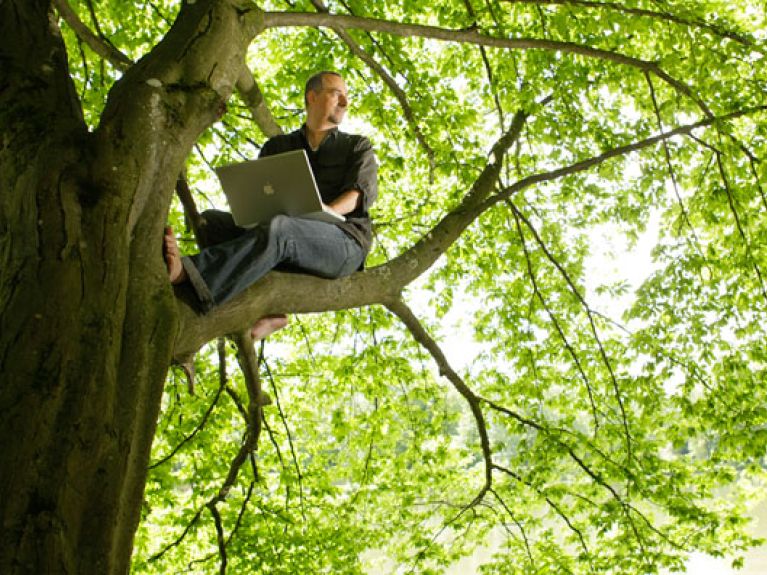Consumers with a Clear Conscience
LOHAS – the acronym stands for Lifestyle of Health and Sustainability. People who belong to this group enjoy being consumers, but are always ecologically correct.

As a child she wanted to be Pope, or Federal Chancellor: influential, high up in the hierarchy. “That’s the way to change the world,” thought Claudia Langer. Her career aspirations came to nothing. She founded an advertising agency, which she sold twelve years later. Claudia Langer still wants to change the world, but now she has a different strategy: work from the bottom up. Last year she launched an Internet portal called utopia.de. “I believe in the power of the consumer,” says the 43-year-old today.
Utopia.de, the Internet portal for “strategic consumption and a sustainable lifestyle,” is the spearhead of the new German eco-movement. More than 17,000 utopians have registered here in the space of six months. They discuss solar cells on the roof, natural cosmetics for your skin, and how to minimize damage to the environment when you go on your skiing holiday. Yet they have little in common with the eco-movement of the nineteen-eighties. They go to wellness hotels, not to peace demos; they eat organic mangos, not muesli; they believe eco should mean fun, not abstinence. “Buy yourself a better world,” is Claudia Langer’s motto. Every day she lives with the dilemma of how to harmonize her aspirations with reality – and occasionally flies home at the end of a trip so she can spend the evening with her children.
Sociologists and market researchers have been observing this trend towards sustainable consumption in Australia, the USA, Asia and Europe. And they have identified the LOHAS as the pioneers. The acronym stands for Lifestyle of Health and Sustainability. “Societal trends towards more sustainability have been around for some time,” says Thomas Perry, sociologist at the Heidelberg-based market research institute Sinus Sociovision, “but the LOHAS are now giving these trends an identity.” And what has changed? “The LOHAS have dropped the idea of asceticism and added a hedonistic element to sustainability.” Fred Grimm, who has written a shopping guide for ethical-ecological consumption, says: “People are fed up with consuming with a guilty conscience.”
This change in thinking has been triggered by a number of factors. First, after mad cow disease (BSE) and a number of food scandals, more and more people started buying organic foods. In the past, to find such produce you had to venture into a wholefood store called Rapunzel or Dandelion – complete with wooden cash desk and wrinkly carrots. These days even discounters sell organic vegetables, and there are modern bio-supermarkets like basic. “We realized that the customers wanted pollution-free – i.e. safe – food, preferably from their own region: in other words organic food,” says Georg Schweisfurth, one of basic’s founders. “At the same time we presented the food in an appetizing way, offered the customers a lot of choice and created a shop with a tasteful, modern appeal in line with the high quality of the products.”
The movement gained momentum with the publication of the World Climate Report in the spring of 2007. “That hit the country like a shock wave,” says market researcher Thomas Perry. “All the environmental indicators suddenly surged.” The influence of the LOHAS is based not on political power but on their collective purchasing power. The economist Werner F. Schulz, Professor of Environmental Management at the University of Hohenheim near Stuttgart, estimates the number of new eco-consumers in Germany at about eight million and their purchasing power at about 200 billion euros (see interview on page 8). Schulz is certain: “This megatrend is set to continue.”
The social scientists at the Heidelberg Sinus Institute estimate that LOHAS make up a significant 20% of the German population. Together with the market research company Microm they have just completed an atlas for every city with more than 70,000 inhabitants, showing the density of LOHAS in every street. According to this atlas, Tübingen in Baden-Wurttemberg is Germany’s LOHAS capital, followed by Norderstedt near Hamburg, Ingolstadt, Freiburg, Münster and Potsdam. “It’s not a revolution,” says Peter Parwan, who has been running the website lohas.de and blogging diligently at lohas-lifestyle.de in the name of sustainability for two years now. People were simply longing for a better quality of life. “I think it’s quite apolitical.”
Sociologist Thomas Perry confirms that LOHAS are “more easy-going than the former eco-propagandists. They are more pragmatic and have little stomach for the old forms of trench warfare.” He says in Germany this pragmatism is largely the result of reunification. “A lot of people stopped thinking in narrow-minded, ideological categories in 1990.” But the Heidelberg-based social researcher thinks it is wrong to regard LOHAS as apolitical. “They want to use consumer decisions as a lever to bring about a change in corporate policies. That’s certainly a political aim, even if it’s outside the framework of the institutional political system.”
Many companies have been targeting the prosperous LOHAS for some time now, selling them green electricity, hybrid cars, natural cosmetics or just trendy fruit drinks. For example, three students – Inga Koster, Marco Knauf and Nicolas Lecloux – seem to have struck oil with their start-up company true fruits marketing smoothies – fruit drinks with no added sugar or preservatives. Even established companies are suddenly turning green, including firms selling coal-fired power stations or cars. They have been bombarding their target groups with such campaigns ever since the discussion on global warming flared up again. The situation is becoming confused. What really is green and what has just been given a green rinse? It’s difficult for a non-expert to get a clear picture.
Is the new eco-movement itself a sustainable phenomenon? Will we end up with a society of LOHAS? Although some people are sceptical towards the LOHAS trend, the new sustainability conscience felt by broad sections of the population seems unlikely to disappear again very soon. “The issue is going to stay with us,” says Konrad Götz of the Institute for Socio-ecological Research in Frankfurt-am-Main. He points out that conditions today are different from 30 years ago. Calls for sustainable development and climate protection are being made by everyone – from the United Nations to the German Chancellor. Industry is reacting with real innovations. And there is a broad target group with ecological awareness. “This combination is new,” says Götz. And he is certain; “There’s no going back.”

